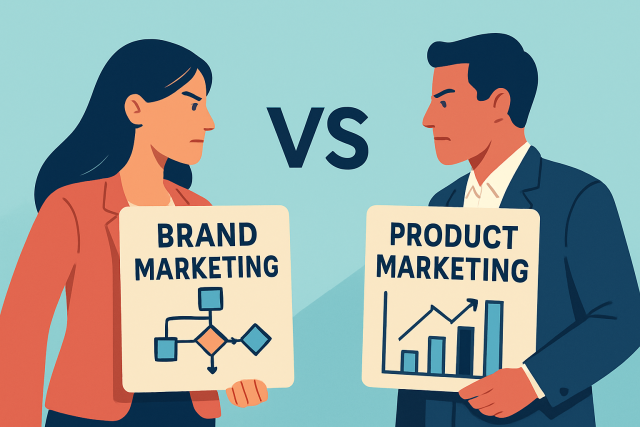
Agile content marketing explained and why it matters now
Explore the fundamentals of agile content marketing, why it’s essential in today’s marketing landsca...

Today’s ever-shifting digital landscape finds businesses scratching their heads trying to nail down the best marketing strategies to truly connect with their audience and spark growth. The debate between content marketing and social media marketing pops up all the time—after all, companies are eager to squeeze every drop of value from their online presence and boost their ROI. Getting a clear handle on how these two approaches differ is key, since each brings its own unique purpose and perks to the table.
Content marketing and social media marketing often overlap, yet they play distinct roles in a marketer's toolkit. Content marketing focuses on creating valuable, relevant material designed to attract and hold onto customers. Social media marketing leverages social platforms to crank up brand visibility and encourage real-time interaction with your audience.
Content marketing is more than just a buzzword—it's a carefully crafted strategy focused on creating and sharing valuable and relevant content to attract and keep a clearly defined audience. The ultimate goal is to gently nudge those people toward profitable customer actions without feeling pushy. You will usually see it take shape in formats like blog posts, ebooks, whitepapers, videos, podcasts and infographics. At its heart the aim is to educate, entertain or tackle the audience's challenges head-on.
Social media marketing leans heavily on platforms like Facebook, Instagram, Twitter, LinkedIn and TikTok to get the word out about products or services. It helps build connections with customers and nurture brand communities that stick around. It’s all about sharing content that resonates, running paid ads that catch the eye and sparking conversations that matter.

Visual representation comparing content marketing formats and social media marketing platforms
Grasping the core goals of content marketing compared to social media marketing is key when deciding which path to take. Content marketing usually aims at building lasting relationships and establishing authority—think of it as the slow and steady approach. Social media marketing often goes for quick engagement and expanding the audience, kind of like throwing a lively party where everyone’s invited.
Strategy in content marketing is all about careful planning and thoughtful content creation. It also ensures that content reaches a variety of channels like websites, email newsletters and social media. On the flip side, social media marketing leans into fast-paced catchy content made for each platform with a heavy dose of interaction and sharing to really get the ball rolling.
Both marketing approaches zero in on audience targeting, yet they usually part ways when it comes to reach and just how personalized they get. Content marketing tends to engage niche or broader audiences by leaning on SEO and crafting content that really speaks to their interests, gradually building those meaningful relationships over time. On the flip side, social media marketing zooms in on specific demographics and behaviors with laser-like precision and can spark viral buzz.
Measuring success in content marketing versus social media marketing boils down to different key performance indicators with distinct focuses. Content marketing usually zeroes in on organic traffic, visitor duration, conversions and search engine rankings. Meanwhile, social media metrics spotlight reach, engagement rates and follower growth as well as the all-important social share of voice.
Tools like Moz and Mangools often prove to be indispensable when measuring and keeping tabs on performance. Moz digs deep with its thorough SEO and content analysis geared towards boosting your content marketing game. Meanwhile, Mangools shines with its user-friendly keyword tracking and clever competitive insights that back content and social media strategies.
This comparison dives into key aspects of Moz and Mangools, two well-known SEO tool suites, giving special attention to pricing, features, and the audiences they’re built for. It’s put together to help marketers pick the best fit without the usual guesswork.
| Comparison Points |  |  |
|---|---|---|
| Pricing | Standard $99, Medium $149, Premium $249; tends to run a bit steep for small businesses watching every penny. | Basic $29.9, Premium $39.9, Agency $79.9; generally friendlier on the wallet for small businesses and those just getting started. |
| Key Features | Keyword Research, Site Audit, Link Building, Rank Tracking—basically the SEO essentials all wrapped in one package. | Keyword Research, Rank Tracking, Competitor & Backlink Analysis—focusing on the must-haves without overcomplicating things. |
| Ease of Use | User-friendly enough but expect a moderate learning curve, especially if SEO is still new territory for you. | Very user-friendly with an intuitive design, making it a breeze for less experienced users to jump right in. |
| Target Audience | SEO professionals, digital marketers, and medium to large businesses who want a robust solution without cutting corners. | Individuals, startups, and small to medium-sized businesses looking for solid SEO without the headache. |
| Competitor & Backlink Analysis | Offers thorough backlink analysis through Moz Link Explorer and handy link building tools that won’t leave you guessing. | Provides reliable competitor insights and backlink audits thanks to tools like LinkMiner and SERPChecker—handy when you need to do some sleuthing. |
| Rank Tracking | Monitors keyword rankings with solid performance insights and competitor comparisons, helping you keep tabs on the competition. | Delivers accurate rank tracking with support for multiple locations and search engines, so your data isn’t one-dimensional. |
| Scalability & Integration | Grows well alongside your business but doesn’t offer a ton of customization or integrations, so don’t expect endless flexibility. | Has limited advanced features and integrations, so it might feel a bit cramped if your ambitions grow beyond a certain point. |
| Pros & Cons | Pros include comprehensive tools, a trusted reputation, and regular updates; cons revolve around the steep price tag and a bit of complexity for SEO newbies. | Pros include affordability, ease of use, and useful competitor tools; cons are fewer advanced features and limited integration options, which might irk power users. |
| Go to Moz Site | Go to Mangools Site |


Moz brings a reliable stash of SEO and content analysis tools to the table to help marketers dive into keyword research and run thorough site audits. It also keeps a close eye on ranking progress. These features really come in handy for fine-tuning content marketing strategies.
Mangools supports content and social media strategies with easy-to-use tools like KWFinder for finding the best keywords, SERPChecker for checking search results, and LinkMiner for monitoring backlinks. This handy toolkit helps marketers find competitive keywords, track rankings, and gauge their online presence without breaking a sweat.
Budgeting for content marketing and social media marketing comes with its own unique set of costs and resource demands. Content marketing often means spending more upfront to craft high-quality content and invest in SEO tools. It also requires steady editorial support over time. On the flip side, social media marketing usually needs a consistent budget to manage platforms, run paid ads and produce content at a faster pace.
| Aspect | Content Marketing | Social Media Marketing |
|---|---|---|
| Average Costs | Usually runs between $3,000 and $10,000 per month, covering content creation plus SEO tools like Moz—kind of the usual suspects in this space | Generally falls between $1,000 and $8,000 monthly, factoring in ad spend and platform management, which can really add up if you’re not careful |
| Time Commitment | Tends to involve longer production cycles that might stretch over days or even weeks for each piece, so patience is a virtue here | Demands daily attention and real-time engagement, keeping you on your toes pretty much every day |
| Tools/Software | Relies on SEO and content planning tools such as Moz and Mangools, the trusty sidekicks of the content world | Uses a mix of tools for social scheduling, analytics, and advertising—the Swiss army knives for social pros |
| Staffing Needs | Often calls for a team including content creators, SEO specialists, and editors to keep things polished | Usually staffed by social media managers, graphic designers, and ad specialists, each playing their part in the social media symphony |
Deciding between content marketing and social media marketing really boils down to your business goals and industry and the audience you are trying to connect with. Businesses aiming for long-term growth and building genuine authority usually get more mileage out of content marketing. On the flip side, if you are after quick visibility and some buzz, social media marketing tends to do the trick.
When comparing content marketing vs social media marketing, tools like Moz and Mangools usually come packed with invaluable insights and handy measurement features.
12 articles published
With over a decade of experience in data-driven marketing, Quentin Moreau is known for his analytical approach and innovative use of metrics to optimize online campaigns for maximum impact.
Read Pages
Explore the fundamentals of agile content marketing, why it’s essential in today’s marketing landsca...

Master the art of crafting irresistible marketing hooks with actionable strategies that boost engage...

Explore the key differences between brand marketing and product marketing with an in-depth compariso...

Discover practical, step-by-step content marketing for events techniques that drive attendance, elev...